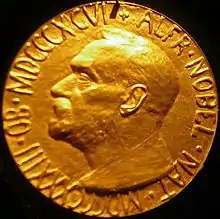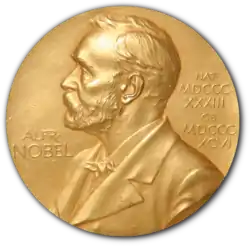David Trimble
William David Trimble, Baron Trimble, PC (born 15 October 1944), is a Northern Irish politician who was the first First Minister of Northern Ireland from 1998 to 2002, and the leader of the Ulster Unionist Party (UUP) from 1995 to 2005.[2][3] He was also the Member of Parliament for Upper Bann from 1990 to 2005 and the Member of the Legislative Assembly (MLA) for Upper Bann from 1998 to 2007. In 2006, he was made a life peer in the House of Lords and a year later left the UUP to join the Conservative Party.
The Lord Trimble | |||||||||||||||||||
|---|---|---|---|---|---|---|---|---|---|---|---|---|---|---|---|---|---|---|---|
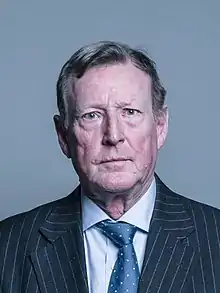 | |||||||||||||||||||
| First Minister of Northern Ireland | |||||||||||||||||||
| In office 1 July 1998 – 14 October 2002* | |||||||||||||||||||
| Preceded by | Office established | ||||||||||||||||||
| Succeeded by | Ian Paisley | ||||||||||||||||||
| Leader of the Ulster Unionist Party | |||||||||||||||||||
| In office 8 September 1995 – 24 June 2005 | |||||||||||||||||||
| Deputy | John Taylor Reg Empey | ||||||||||||||||||
| Preceded by | James Molyneaux | ||||||||||||||||||
| Succeeded by | Reg Empey | ||||||||||||||||||
| Member of the Legislative Assembly for Upper Bann | |||||||||||||||||||
| In office 25 June 1998 – 7 March 2007 | |||||||||||||||||||
| Preceded by | Office created | ||||||||||||||||||
| Succeeded by | George Savage | ||||||||||||||||||
| |||||||||||||||||||
| Personal details | |||||||||||||||||||
| Born | William David Trimble 15 October 1944 Bangor, Northern Ireland, UK | ||||||||||||||||||
| Nationality | British | ||||||||||||||||||
| Political party | Conservative Party (2007–present) | ||||||||||||||||||
| Other political affiliations | Ulster Unionist (Before 1973; 1978–2005) Ulster Vanguard (1973–1978) | ||||||||||||||||||
| Spouse(s) | Heather McComb (1968–1976) Daphne Orr (1978–present) | ||||||||||||||||||
| Children | 4 | ||||||||||||||||||
| Parents | William Trimble Ivy Trimble | ||||||||||||||||||
| Residence | Banbridge, County Down | ||||||||||||||||||
| Alma mater | Queen's University, Belfast | ||||||||||||||||||
| Occupation | Politician | ||||||||||||||||||
| Profession | Barrister Lecturer | ||||||||||||||||||
| Website | Official Website | ||||||||||||||||||
Trimble began his career as a Professor of Law at The Queen's University of Belfast in the 1970s, during which time he began to get involved with the paramilitary-linked Vanguard Progressive Unionist Party. He was elected to the Northern Ireland Constitutional Convention in 1975, and joined the UUP in 1978 after the VPUP disbanded.[3] Remaining at Queen's University, he continued his academic career until being elected as the MP for Upper Bann in 1990. In 1995 he was unexpectedly elected as the leader of the UUP.[3] He was instrumental in the negotiations that led to the Good Friday Agreement in 1998, and (along with John Hume) won the Nobel Peace Prize that year for his efforts. He was later elected to become the first First Minister of Northern Ireland, although his tenure was turbulent and frequently interrupted by disagreements over the timetable for Provisional Irish Republican Army decommissioning.
After being defeated at the 2005 general election, Trimble resigned the leadership of the UUP soon afterwards. In June 2006, he accepted a life peerage in the House of Lords, taking the title of Baron Trimble, of Lisnagarvey in the County of Antrim.[4] He did not stand again for the Assembly, which finally reconvened in 2007, instead leaving the UUP to join the Conservative Party.[5]
Early life and education
Trimble was the son of William and Ivy Trimble, lower-middle class Presbyterians who lived in Bangor, County Down.[6][7] He attended Bangor Grammar School (1956–63).[8] Trimble's paternal grandfather George was born in Easkey, County Sligo, to parents William Trimble and Mary Burns.
He studied at Queen's University of Belfast (QUB) from 1964 to 1968, where he was awarded the McKane Medal for Jurisprudence.[8] He received a first class honours degree (the first at Queen's in three years), becoming a Bachelor of Laws (LL.B).[9][10]
Early career
Academic career
Trimble qualified as a barrister in 1969. He began that year as a Queen's University of Belfast lecturer, subsequently becoming Assistant Dean of the law faculty from 1973 to 1975, a Senior Lecturer in 1977, and Head of the Department of Commercial and Property Law from 1981 to 1989.[8][11][12][13] He resigned from the university in 1990 when he was elected to Parliament.[8]
In 1983, as he sat in his office at the university, he heard gunshots which turned out to be those of IRA killers of Edgar Graham, a friend and fellow law professor.[13] He was asked to identify the body.[13] In 1994 he was told by the Royal Ulster Constabulary that he had been targeted for assassination.[13]
Political career
Trimble became involved with the right-wing, paramilitary-linked Vanguard Unionist Progressive Party (known as Vanguard) in the early 1970s. He ran unsuccessfully for the party in the 1973 Assembly election for North Down, coming last.[14] In 1974, he was a legal adviser to the Ulster Workers' Council during the successful UWC strike against the Sunningdale Agreement.[15]
He was elected to the Northern Ireland Constitutional Convention in 1975 as a Vanguard member for Belfast South, and for a time he served as the party's joint deputy leader, along with the Ulster Defence Association's Glenn Barr.[16] The party had been established by Bill Craig to oppose sharing power with Irish Nationalists, and to prevent closer ties with the Republic of Ireland; however Trimble was one of those to back Craig when the party split over Craig's proposal to allow voluntary power sharing with the SDLP.
He joined the mainstream Ulster Unionist Party (UUP) in 1978 after Vanguard disbanded, and was elected one of the four party secretaries.[10][16] He served as Vice Chairman of the Lagan Valley Unionist Association from 1983 to 1985, and was named chairman in 1985.[11] He served as chairman of the UUP Legal Committee from 1989 to 1995 and as honorary secretary of the Ulster Unionist Council in 1990–96.[11]
He was elected to Parliament with 58% of the vote in a by-election in Upper Bann in 1990.[16][17][18] He was one of the few British politicians who urged support for the government of Bosnia and Herzegovina during the civil war in the 1990s.
Leader of the Ulster Unionist Party
On 8 September 1995, Trimble unexpectedly won election as Leader of the UUP, defeating the front-runner John Taylor and three other candidates.[12][19]
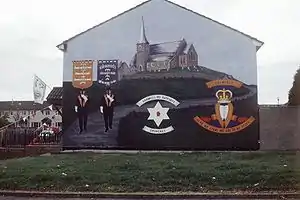
Trimble's election as Leader came in the aftermath of his role in the Drumcree conflict, in which he led a controversial 1995 Orange Order Protestant march, amidst Nationalist protest, down the predominantly Catholic nationalist Garvaghy Road in Portadown, County Armagh.[6][12] Trimble and Democratic Unionist Party Leader Ian Paisley walked hand-in-hand as the march, banned since 1997, proceeded down the road.[20] Many Irish Catholics viewed it as insensitive, while many Protestants felt that it was a sign that Trimble was defending them.[12]
Shortly after the election, Trimble became the first UUP Leader in 30 years (since Terence O'Neill) to meet with the Taoiseach in Dublin.[12] In 1997, he became the first unionist leader since the partition of Ireland in 1921 to agree to negotiate with Sinn Féin.[21]
Later, in the All-Party negotiations, he led the UUP delegation and sat at the table with Sinn Féin, though in the eight months of the negotiations he never spoke directly to their leader, Gerry Adams.[6][11] The talks were successful, culminating in the Belfast Agreement of 10 April 1998, which resulted in power-sharing with Nationalists.[10][11] On 22 May 1998, voters in Northern Ireland approved the agreement, with 71 per cent in favour.[11]
Trimble was appointed to the Privy Council of the United Kingdom in the 1998 New Year Honours.[22][23]
First Minister of Northern Ireland
Trimble at first opposed the appointment of former U.S. Senator George Mitchell as the chairman of multi-party talks, but eventually accepted him. The talks resulted in the Good Friday Agreement (GFA) of April 1998.[24] Trimble was subsequently seen as instrumental in getting his party to accept the accord.[25]
Trimble was elected on 25 June 1998 as a Member of the Northern Ireland Assembly for Upper Bann.[11] He was elected First Minister of Northern Ireland on 1 July 1998.[11]
Arguments over the extent of Provisional Irish Republican Army decommissioning led to repeated disruptions during Trimble's tenure as First Minister. In particular:
- The office of First Minister was suspended from 11 February 2000 to 30 May 2000
- Trimble resigned as First Minister on 1 July 2001 due to the continuing impasse arising from the IRA's refusal of his demands that it decommission its arms, as per the commitments all parties had signed up to in section 7 pt. 3 (page 25) [26] of the 1998 Good Friday Agreement[27] but he was re-elected on 5 November 2001
- The Assembly was suspended from 14 October 2002 until 2007 due to accusations of an IRA spy ring being operated there (the so-called Stormontgate Affair)
In 1998, Tony Blair announced a new judicial inquiry, the Bloody Sunday Inquiry, into the killing of 13 unarmed civil rights marchers in Derry in 1972. A previous investigation, the Widgery Tribunal, into the same event had been discredited. During the debate in the House of Commons, Trimble was one of few dissenting voices. He said "I am sorry to have to say to the Prime Minister that I think that the hope expressed by the Honourable Member for Foyle [John Hume] that this will be part of the healing process is likely to be misplaced. Opening old wounds like this is likely to do more harm than good. The basic facts of the situation are known and not open to dispute."[28] Reporting in 2010, the Saville Inquiry confirmed that all of the 13 killings and 13 woundings were unjustified.[29]
Peerage
At the general elections of 2005, Trimble was defeated in Upper Bann by the Democratic Unionist Party's David Simpson in his bid for re-election to Parliament in Westminster. The Ulster Unionist Party retained only one seat in Parliament (out of 18 in Northern Ireland) after the 2005 general election, and Trimble resigned the party leadership on 7 May 2005.
On 11 April 2006, it was announced that Trimble would take a seat in the House of Lords as a working life peer.[30] On 21 May 2006 it was announced that he had chosen the geographical designation Lisnagarvey, the original name for his adopted home town of Lisburn. Subsequently, on 2 June 2006, he was created Baron Trimble, of Lisnagarvey in the County of Antrim.[31]
On 18 December 2006, he announced that he would be standing down from the Northern Ireland Assembly at the next election.[32]
Trimble was named an Honorary Patron of the University Philosophical Society, Trinity College, Dublin.
On 17 April 2007, Trimble announced he had decided to join the Conservative Party in order to have greater influence in politics in the United Kingdom.[5] At the same time, however, he stated that he did not intend to campaign against the Ulster Unionist Party, and proposed the idea of a future alliance between the Conservatives and the Ulster Unionists, similar to that which had existed prior to 1974 and the fallout of the Sunningdale Agreement. This idea became reality with the formation of the electoral alliance of Ulster Conservatives and Unionists in late 2008. It was reported that if the Conservatives won the 2010 general election, Trimble would receive a "significant" ministerial role, possibly in the Cabinet.[33] In the event, however, Trimble was not offered any governmental or front bench position following the formation of the Conservative–Liberal Democrat coalition government.
In May 2010, Trimble joined the Friends of Israel Initiative, a non-Jewish international project supporting Israel's right to exist. The initiative, started by former prime minister of Spain José María Aznar, also included former United States Ambassador to the United Nations John R. Bolton, British historian Andrew Roberts, and former Peruvian president Alejandro Toledo.[34] On 29 January 2013, Trimble and Aznar co-wrote an article in The Times condemning Hezbollah and calling on European governments to list it as a terrorist organisation.[35]
In 2016, Trimble supported the Leave side in the UK referendum on EU membership. He said that if he had ever had any doubts about the issue, "his eight years on the EU Select Committees in the House of Lords – which scrutinise the EU's operations – had convinced him of the need to cut ties with Brussels". He cited a study which found that economic growth in the UK reduced after the decision to enter the Common Market, and reduced further when the UK went into the Single Market.[36]
Turkel Commission of Inquiry
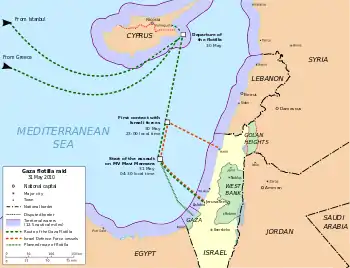
On 14 June 2010, Trimble was appointed as an observer to the Israeli special independent public Turkel Commission of Inquiry into the Gaza flotilla raid.[37][38]
The Commission investigated whether Israel's actions in preventing the arrival of ships in Gaza were in accordance with international law.[38] It focused among other things on the security considerations for imposing a naval blockade on the Gaza Strip and the conformity of the naval blockade with the rules of international law; the conformity of the actions during the raid to principles of international law; and the actions taken by those who organised and participated in the flotilla, and their identities.[38]
On the commission were former Israeli Supreme Court Justice, Jacob Turkel, and former Technion University President, Amos Horev, as well two other members added in July 2010. (Bar Ilan University Professor of International Law Shabtai Rosenne also served on the commission from its establishment until his death on 21 September 2010.[39]) In addition, the commission had two foreign observers, Trimble and former head of the Canadian military's judiciary, Judge Advocate General, Ken Watkin, who took part in hearings and discussions, but did not vote on the final conclusions.[40][41] The panel, in January 2011, concluded both Israel's naval blockade of Gaza and the interception of the flotilla "were found to be legally pursuant to the rules of international law".[42]
Personal life
Trimble's first marriage, to Heather McComb in August 1968, ended in divorce in 1976. There were no children from his first marriage. Trimble married a former student, Daphne Elizabeth (née Orr), in August 1978. They have two sons and two daughters (Richard, Victoria, Nicholas, and Sarah).[7] Lady Trimble served as a member of the Equality Commission for Northern Ireland, and later the Northern Ireland Human Rights Commission, before standing unsuccessfully in the UK parliamentary election of May 2010 for the Ulster Conservatives and Unionists.
His son Nicholas is active within the Ulster Unionist Party. In 2016 Nicholas Trimble was co-opted to replace Alexander Redpath as a Councillor representing Downshire West on Lisburn and Castlereagh City Council.
In July 2019, he admitted that he was "forced" to change his position on same-sex marriage and partnerships after voting against them, because of his lesbian daughter Vicky who married her girlfriend Rosalind Stephens in Scotland in 2017. He told peers in the House of Lords "I cannot change that, and I cannot now go around saying that I am opposed to it because I acquiesced to it. There we are."[43][44][45]
Honours
In October 1998, Trimble and John Hume were awarded the Nobel Peace Prize for their efforts to find a peaceful solution to the conflict in Northern Ireland.[46] The Nobel Institute noted:
As the leader of the traditionally predominant party in Northern Ireland, David Trimble showed great political courage when, at a critical stage of the process, he advocated solutions which led to the [Belfast (Good Friday)] peace agreement.[46]
At a ceremony in Paris on 8 December 1999, Trimble was appointed an Officier in the Légion d'Honneur by the French Government.[47]
In 2002, Trimble was awarded the Golden Plate Award of the American Academy of Achievement.[48]
Selected works
Books
- To Raise Up a New Northern Ireland: Articles and Speeches 1998–2000, David Trimble, The Belfast Press, 2001
- W D Trimble (1991). The foundation of Northern Ireland. Lurgan, Co. Armagh: Ulster Society Publications. p. 43. ISBN 9781872076102. OCLC 26273413 – via archive.is.
Articles
- "The Belfast Agreement", David Trimble, 22 Fordham International Law Journal 1145, 1998–99
See also
Notes and references
- "Elvis Presley". Great Lives. 14 August 2007. BBC Radio 4. Retrieved 18 June 2014.
- "The Stormont debacle: Opinions divided on d'Hondt drama; From Portrush to Portaferry and Larne to Strabane the people of Ulster were split over the shambles at Stormont. Stephen Dunwoody assesses the mood on the streets". News Letter. Johnston Publishing. 16 July 1999. Retrieved 28 June 2010 – via Questia Online Library.
- "David Trimble (British politician)". Encyclopædia Britannica. 15 October 1944. Retrieved 29 June 2010.
- "No. 58004". The London Gazette. 7 June 2006. p. 7793.
- "Statement by the Rt. Hon. The Lord Trimble, Tuesday, 17 April 2007". Official website (Press release). David Trimble. 17 April 2007. Archived from the original on 3 July 2007. Retrieved 17 April 2007.
Consequently I have decided to join the Conservatives.
- Abrams, Irwin (2001). The Nobel Peace Prize and the ... ISBN 9780881353884. Retrieved 29 June 2010.
- Newsmakers. 2000. ISBN 9780787621124. Retrieved 28 June 2010.
- "The Rt. Hon. Lord David Trimble". TMC Entertainment. Retrieved 30 June 2010.
- Dod, Charles Roger; Dod, Robert Phipps (16 October 2008). Dod's parliamentary companion. ISBN 9780905702360. Retrieved 28 June 2010.
- "Obiter Dicta" (PDF). Warwick Law Society. Spring 2004. Archived from the original (PDF) on 8 March 2012. Retrieved 30 June 2010.
- "David Trimble – Biography". NobelPrize.org. Nobel Prize Organisation. Retrieved 29 June 2010.
- "Irish leader in U.S. for talks". The Day. 2 November 1995 – via Google News.
- "New Unionist leader represents new style but old philosophy". Daytona Beach Sunday News. 2 October 1995 – via Google News.
- North Down 1973–1982, Northern Ireland Elections (ARK - Access Research Knowledge)
- Plowright, John (2006). The Routledge Dictionary of Modern British History. ISBN 9780415192439. Retrieved 30 June 2010.
- Abrams, Irwin (2001). The Nobel Peace Prize and the ... ISBN 9780881353884. Retrieved 29 June 2010.
- "Tories trounced in N. Ireland". Tuscaloosa News.
- "No. 52150". The London Gazette. 25 May 1990. p. 9691.
- "Ulster Protestant Party Names a Hard-Liner". The New York Times. 9 September 1995. Retrieved 29 June 2010.
- Drumcree Parade 1995 Archived 3 June 2016 at the Wayback Machine BBC News
- James F Clarity (18 September 1997). "Key Ulster Protestant agrees to join talks with Sinn Fein". Tuscaloosa News – via Google News Archive.
- "No. 54993". The London Gazette (Supplement). 30 December 1997. p. 1.
- "Life Peers to Order of the Companion of Honour". BBC News. 31 December 1997. Retrieved 28 June 2010.
- "Mitchell takes seat in Ulster - and hardliners walk out". Deseret News. Associated Press. 12 June 1996 – via Google News Archive.
- "Key players". The Telegraph. 25 October 2001. Retrieved 30 June 2010.
- "The Agreement" (PDF). Northern Ireland Office. Archived from the original (PDF) on 3 October 2011. Retrieved 3 November 2011.
- "The long and arduous road to paramilitary decommissioning". Belfast Telegraph. Independent News and Media. 19 June 2009. Retrieved 29 June 2010.
- Department of the Official Report (Hansard), House of Commons, Westminster (29 January 1998). "Hansard Record of Commons Debate launching the Saville Inquiry". Hansard. UK Parliament. Archived from the original on 7 November 2013. Retrieved 16 June 2010.CS1 maint: multiple names: authors list (link)
- "Bloody Sunday 'unjustified and unjustifiable'". The Independent. ESI Media. Press Association. 15 June 2010. Retrieved 7 December 2018.
- "New working life peers unveiled". BBC News. 11 April 2006. Retrieved 18 April 2007.
- "No. 58004". The London Gazette. 7 June 2006. p. 7793.
- "Trimble set to quit assembly seat". BBC News. 18 December 2006. Retrieved 18 April 2007.
- "Lord Trimble lined up as minister in Cameron government". The Telegraph. 24 July 2008. Retrieved 25 July 2008.
- "Aznar, Trimble to launch new pro-Israel project. 'Friends of Israel'". The Jerusalem Post. 31 May 2010. Archived from the original on 17 June 2010. Retrieved 14 June 2010.
- David Trimble; Jose Maria Aznar (29 January 2013). "Don't Mince Words. Hezbollah are terrorists". The Times. Times Newspapers. Retrieved 29 January 2013.(subscription required)
- Sam McBride (26 March 2016). "EU isn't working on economic grounds: Trimble". The Newsletter. Johnston Publishing.
- Zrahiya, Zvi (17 June 2010). "Israeli members of flotilla inquiry panel meet for first time". Haaretz. Retrieved 17 June 2010.
- "Cabinet asked to approve independent public commission". Israel Ministry of Foreign Affairs. 13 June 2010. Archived from the original on 22 June 2010. Retrieved 17 June 2010.
- Ravid, Barak; Oren, Amir (22 September 2010). "Turkel Committee Member Shabtai Rosenne Dies at 93". Haaretz. Haaretz Daily Newspaper.
- "Gaza flotilla inquiry panel members". BBC News. 14 June 2010.
- "Who's Who on Israel's Committee on the Gaza Flotilla Raid". Haaretz. Haaretz Daily Newspaper. 14 June 2010.
- Weiss, Mark (24 January 2011). "Israeli inquiry clears soldiers over Gaza flotilla raid". The Irish Times.
- "Trimble reveals daughter is in a same-sex marriage" – via www.belfasttelegraph.co.uk.
- "Daughter of former Northern Ireland first minister Trimble reveals his happiness with same-sex marriage" – via www.belfasttelegraph.co.uk.
- "It was accept our relationship or lose a daughter". BBC News.
- "Nobel Peace Prize 1998, John Hume and David Trimble". Boes.org. Retrieved 30 June 2010.
- "French elevate Trimble to 'living elite' with the Legion d'honneur". The Independent. 9 December 1999.
- "Golden Plate Awardees of the American Academy of Achievement". www.achievement.org.
Further reading
- Godson, Dean (2004). Himself Alone: David Trimble and the Ordeal of Unionism. HarperCollins, ISBN 0-00-257098-X
- Kerr, Michael (2005). Transforming Unionism: David Trimble and the 2005 Election. Irish Academic Press, ISBN 0-7165-3389-8
- MacDonald, Henry (2001). Trimble. Bloomsbury Publishing, ISBN 0-7475-5315-7
- Millar, Frank (2004). David Trimble: The Price of Peace. Liffey Press, ISBN 1-904148-60-3
External links
- Profile at the Parliament of the United Kingdom
- Contributions in Parliament at Hansard 1803–2005
- Current session contributions in Parliament at Hansard
- Voting record at PublicWhip.org
- Record in Parliament at TheyWorkForYou.com
- Profile at BBC News Democracy Live
- Articles authored at Journalisted
- David Trimble bio Northern Ireland Assembly (Archived)
- Lord Trimble
- David Trimble on Nobelprize.org

- The Search for Peace: David Trimble BBC News
- Maiden Speech : House of Commons – 23 May 1990 UK Parliament
- David Trimble Biography and Interview with American Academy of Achievement
- Appearances on C-SPAN
| Parliament of the United Kingdom | ||
|---|---|---|
| Preceded by Harold McCusker |
Member of Parliament for Upper Bann 1990 – 2005 |
Succeeded by David Simpson |
| Northern Ireland Assembly | ||
| New assembly | Member of the Legislative Assembly for Upper Bann 1998 – 2007 |
Succeeded by George Savage |
| Political offices | ||
| New office | First Minister of Northern Ireland 1998–2001 |
Succeeded by Reg Empey Acting |
| Preceded by Reg Empey Acting |
First Minister of Northern Ireland 2001–2002 |
Vacant Office suspended Title next held by Ian Paisley |
| Party political offices | ||
| Preceded by Ernest Baird Lindsay Smyth |
Deputy Leader of the Vanguard Unionist Progressive Party 1975–1978 Served alongside: Glenn Barr |
Position abolished |
| Preceded by James Molyneaux |
Leader of the Ulster Unionist Party 1995–2005 |
Succeeded by Reg Empey |
| Orders of precedence in the United Kingdom | ||
| Preceded by The Lord Teverson |
Gentlemen Baron Trimble |
Followed by The Lord Sheikh |
